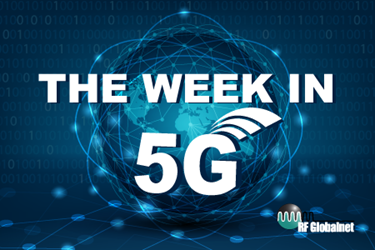The Week in 5G: 11/17/2020 — Huawei Tries To Flip UK Equipment Ban; Dish Network Inks First Infrastructure Deal
By Ed Biller

While 5G technology’s development has spurred advances in cybersecurity, Kevin McNamee, director of threat intelligence at Nokia, told virtual attendees at the recent (ISC)2 Security Congress that 5G also is “expanding the attack surface,” reports Infosecurity Magazine.
McNamee cited five ways 5G had expanded the attack surface: the proliferation of unprotected IoT devices, “multi-access edge computing,” the abuse of 5G bandwidth via DDoS attacks, the possibility of network slicing focusing cyberattacks on certain parts of a network, and the possible greater visibility “of the 5G IP address space.”
Dark Reading contributor Paul Shomo also expressed in a recent column concern about the cybersecurity threats presented by 5G IoT devices, noting that, “this summer, the Defense Advanced Research Projects Agency (DARPA) released IoT research grants. And in a separate but parallel development, academic researchers at the Association of Computing Machinery (ACM) simultaneously launched a program allowing industry IoT experts to collaborate with academic researchers.”
Staying in the U.S. for a moment, Dish Network has signed a multi-year anchor tenant tower agreement with Crown Castle International, reports Seeking Alpha. The deal — which facilitates Dish’s 5G network buildout— is the satellite broadcast provider’s first infrastructure partnership and allows Dish to lease space on up to 20,000 Crown Castle towers. It also provides Dish with “certain fiber transport services …[and] the option to use Crown Castle for pre-construction.”
In the United Kingdom, Huawei VP Victor Zhang is trying to convince the nation that outgoing President Donald Trump’s ouster in the U.S. provides an opportunity for the UK to revisit its ban on Huawei equipment in its 5G network, reports The Guardian.
A change in position would be the UK’s second switcheroo: in July, UK lawmakers responded to U.S. pressure by reversing a plan that initially allowed Huawei to be “a controlled 5G supplier.” Zhang called a Huawei-inclusive 5G rollout “vital for the UK’s recovery post-COVID and after Brexit.”
Related, despite reportedly skipping a recent meeting with a U.S. official bent on convincing Brazilian lawmakers to ban Huawei equipment, Brazil’s government now has backed the United States’ Clean Network proposal — a “global digital alliance that excludes technology that Washington sees as manipulated by China’s Communist government” — reports Reuters.
Finally, China reportedly has launched “the world’s first 6G test satellite,” into space, reports the New York Post.
“The satellite, called Star Era-12, has frequency bands so high that they have to be tested in space so the signals won’t be lost as easily as in air, the National Science Foundation’s Thyagarajan Nandagopal explained to The Post,” states the report.
